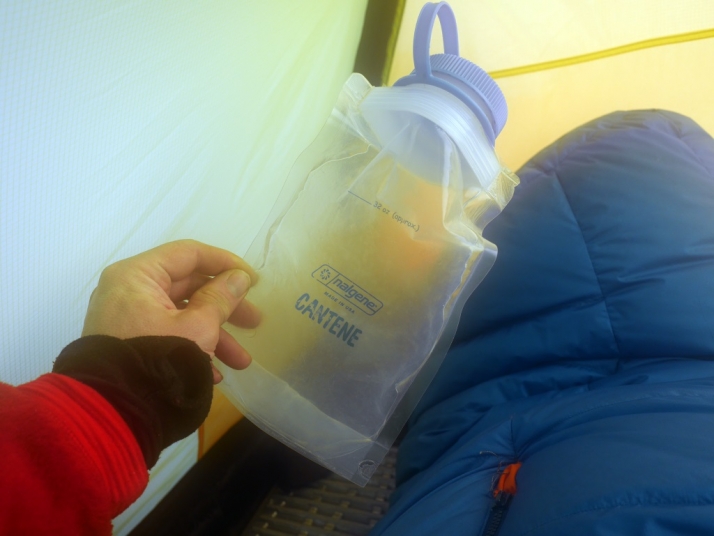Tracking
the Journey
-
Distance to go:
0 Mi
Distance
Ben and Tarka will cover 1800 miles starting from Scott's Terra Nova Hut at the edge of Antarctica to the South Pole and back to the coast again. That's equivalent to 69 back-to-back marathons hauling up to 200kg each (the weight of roughly two adult men) of kit and supplies necessary to survive.
Distances here are shown in statute miles.
Lolloping (Day 75)
Day 75: S87° 07' 2.7", E159° 35' 28.8"
Duration: 8 Hr 45 Min
Daily distance: 22.5 Mi
Distance to go: 699 Mi
Temperature: -22 °C
Wind chill: -35 °C
Altitude: 9764 Ft

For some reason I got out of the wrong side of my sleeping bag this morning, metaphorically at least, and started the day fed up with the plateau and its biting wind, fed up with my fingers and thumbs that throb painfully when they get cold, fed up with eating and drinking lying on my side in a cramped tent, fed up with wearing the same clothes for two-and-a-half months, fed up with sharing a pee bottle (see today's photo!) and feeling unusually homesick, not only for the people I love (and my dog, Molly) but also for the simple pleasures of sitting at a table, for example, walking around barefoot, drinking out of a china mug and indeed not having to use a pee bottle. All the stuff we take for granted.
My mood wasn't improved by the fact that Tarka, by his own admission, had the bit between his teeth today. His first 45-minute session was the fastest of our entire expedition and he stretched out a huge lead. I tried to keep up at first, but then slowed down, telling myself that I was still under doctor's orders (and mum's orders, more to the point) to take it steadily after being so exhausted only a couple of days ago.
Tarks and I came the closest we've ever come to a full-blown argument when I finally caught up with him to eat and drink. His viewpoint was that we're both tired and depleted, therefore we should get off the plateau as fast as we can. My viewpoint was that we're both tired and depleted, therefore we should travel steadily and conserve our energy. Neither of us was right or wrong, and both arguments had merit and wisdom, but it took a little while for me to forgive (and now laugh about) his use of the word "lolloping" to describe my pace first thing today.
We're often pretty frank with each other, and we're well aware that we both do a lot - especially in such a high-pressure, close-quarters partnership - that we each find irritating, but we've become very good at being able to speak openly without being too judgemental or offensive, and we've become unusually quick to forgive.
I've been given a couple of questions:
Q) Apparently a few people have asked if we've suffered from either "Polar thigh" (skin damage to the inner thighs, usually caused by a combination of frost/wind damage and chafing) or blisters.
A) Thankfully no polar thigh, though strangely my kneecaps got a bit battered early on, I think from the fabric of my salopettes being pulled tight against them when I sat on my sledge at breaks in high winds. I'm also happy and proud to report that we're a blister-free expedition so far. Tarka taped his feet up early on, but I've yet to use a single plaster, dressing or bit of tape on mine, which I'm chuffed with after giving my poor feet more than 1,000 miles of abuse so far. Our Alfa boots, Intuition liners and Smartwool socks have been faultless, and I'm grateful to Christian at Sportsnett in Oslo for his sage advice on that front!
Q) Someone else (alas I'm not sure who - sorry!) asked why we're not using traction kites to tow ourselves and our sledges, and why this might qualify as "support" whereas using solar power does not.
A) This could descend into pages of debate, but from the outset I wanted this to be a human-powered expedition, and an exercise in pursuing and exploring physical and mental limits. Everyone knows where the South Pole is these days, so we're not exploring in the Edwardian sense, but no one has travelled 2,900km in these conditions on foot so to me that's the area of interest. Kites have become so sophisticated and effective that it's possible to travel more than ten times as fast as we can under our own motive power, and recent expeditions have covered more than 400km per day. Some may argue that Scott used a small sail on his sledge when they had a following wind, but they certainly weren't flying along at 40 kilometres per hour, wearing crash helmets. Kite-powered polar travel has become so extremely fast and efficient that to me it bore no resemblance to the way that Scott travelled, and that success using kites depends on wind speed and direction rather than fitness, nutrition and sheer willpower. Comparing rowing and sailing is probably the simplest way of looking at it. The solar power one's interesting. If we were using vast panels to power electric skidoos then things might be different, but the electricity we generate from the roof of our tent every night only allows us to share our story; it doesn't make the pulling the slightest bit easier.










Comments
# Richard Pierce, January 8th 2014
Dear Ben,
It’s good to hear that you’re getting on each other’s nerves at times, because that’s real. To me, too, it indicates that you’re both actually still (or again) much stronger than you thought you were. And, to be honest about myself, I always find myself withdrawing from friendships (at least mentally) at the very moment something happens to make those friendships really close and meaningful. I don’t know what that says about me, though I think it might say something about us humans in general, too.
You’re both right about your efforts on the plateau, of course, but the deciding factor will be how carefully you pick your way back down old man Beardmore who seemed to be rather forgiving on your ascent. I hope he hasn’t kept back any nasty surprises for your descent.
Thanks for the long answer on the kites, not for my sake, because I understood the rationale from the start, but for the benefit of all who read the blog. Scott and his menjust strung up stray bits of canvas on their sledges to assist their hauling; at no time would those “sails” have managed to drive the sledges on their own. And, to put the comms into context, neither Scott nor Amundsen had radios with them because, in 1911, comms technology was utterly unreliable.
I’m glad you’re making good distances. This time next week, you’ll hopefully have started your descent.
Take care, and God Speed.
R
# Dan Fall, January 9th 2014
Pretty neat story hearing about you lolloping though Antartica. I can’t imagine trying to match pace with another human for 1800 miles of skiing and pulking, while battling the cold. My old friend works with me and he goes into the lumberyard at about 1/3rd my pace and I usually tell him to make sure he doesn’t hurt himself, so I’ll try to be a little nicer and ask him not to lollop next time. Was there any cushion in the planning so if you are 3 miles ahead of plan one day, you could run at a reduced rate or is the schedule that tight?
# Intrepid, January 8th 2014
What a scene that argument must have been—smack dab in the middle of the blasted deserted white flat as a pancake plateau, two men letting their difference rip while both wanting to be done with whatever agonies the 1100 miles has brought with them. If you end up writing a book don’t forget to include what you were actually thinking while you couldn’t forgive Tarka for using lolloping to describe your pace. That would be very telling, ie, were your thoughts orderly or discombobulated, did they show wear and tear or did you have some kind of breakthrough moment?
On a different note, even with keeping to your mother’s and doctor’s orders you guys are down to under 700 miles to go. Congratulations!!
A picture of the pee bottle is pretty funny. It got me to wonder whether leaving a yellow trail would be helpful.
Hang in there.
Peace & Godspeed
# harry carey, January 8th 2014
dear Ben and Tarka
i am following you because i’m inspired by your bravery and, i’m learning about you in my school. we have learnt about Scotts and Amudsens race also for you to put up with what scott tried to do I think that is amazing and really courageous.
from Harry carey age 9.
# t.g, January 11th 2014
Hi
# wonderwoman, January 8th 2014
The human factor is the most interesting thing on this expedition and in life. I can find in myself what Richard says about withdrawing. And every married couple knows the facts Ben is talking about: being to close and irritating. What amazes me,are the ways we cope with it, start getting closer and helping each other over and over again. Like insects around a light in the night.
We send you love from Finland and pray for you.
# Jen, January 8th 2014
Disagreements are to be expected, but to be able to deal with them in such extremes, well that takes something rather special. Although I can imagine in my head a Gary Larson cartoon of the pair of you, with some kind of huff going on.
You’re both wonderful, keep it up. Doing so well.
# Alison Lowndes, January 8th 2014
Lolloping! .. my new word for 2014.
You’re both, as ever, my Heros. X
# John Brain, January 8th 2014
It is really good to see that you are now both making excellent progress again and massive support for you remains across the world. We are all with you.
Thank you for your excellent answer on ‘kite travel’ which makes a lot of sense. I too thought that using a kite would not jeopardise the notion of ‘unsupported’ but I am now convinced otherwise.
It is well to remember that almost all other like expeditions have had real problems in terms of personal relationships between participants, under what are the most stressful psychological circumstances. You two have been remarkable for your mutual teamwork and lack of attrition and it is clearly making a great contribution to your success. So keep smiling at each other, whatever!
# Hilary, January 8th 2014
Yay, less than 700 miles to go. You are getting there slowly but surely, although over 22 miles in a day is not so slow. Keep going, not too long and you’ll be at a lower altitude with more air to breathe and the homeward stretch in front of you. Cheering you on as always, take care, and look forward to tomorrow’s blog.
# Stephen Hackett, January 8th 2014
Sharing a pee bottle must make for a very special bond between you guys. Can’t imagine RFS going in for that: unless it was one for gentlemen & officers, and another for PO Evans.
God speed.
# Richard Pierce, January 8th 2014
Actually, I can imagine RFS going for that. It was Shackleton who had a separate room for himself in his hut at Cape Royds, while RFS actually shared an open sleeping cubicle with Wilson and Teddy Evans in the Terra Nova Hut at Cape Evans.
R
# Offroading Home, January 9th 2014
Good point Richard.
Tangentially, the MODIS satellite image shows that today’s treck (1/8/14) has put them back in the more difficult terrain as the ice sheet bunches up before going down the Beardmore. The difficulty is even evidenced in the increased variability in their hourly pace today from days previous. Perhaps overcoming the terrain will distract a bit from other concerns?
# Uncle Pete, January 8th 2014
The best of superheroes can get p****d off! Maybe it will humour you to read the manufacture’s website hints (* for wider audience!)
‘Fill our flexible CANTENES with 32-, 48-, or 96 ounces of your favorite drink’
&
‘Gusseted bottom allows Cantene to stand when full’
but beware temperature (that’s how you spell it!) range is only ’ -29ºC (-20ºF) to 104ºC (220ºF)’
Good - don’t keep the emotions bottled up, eat up the miles, heed Richard’s caution for the descent and look forward to all that Oxygen! Best wishes as ever.
# Janet Stanley, January 8th 2014
Hi! This very human of you both,you are in good company, Scott & Shackleton’s men had more than a few disagreements, it’s human nature after being in each other’s company for so long & in such close quarters…just like an old married couple but oh the stories you can tell….& the bond you will have. Pace yourself, it is your body telling you what is best & lollop is a great word! Please be safe :)
# Pavol Timko, January 8th 2014
I am thinking many times of you guys, how you struggle in lady-less South. Being without people you love is something hard but in the past it was even harder because early expeditions had to spend one or two polar winters in order to dare to travel to Pole during antarctic “summer”.
Here are the words of dedication from the book which describes such an endeavour :
To the little family, the officers, the scientific staff, and the crew of the “Belgica”, whose fortunes and misfortunes made this story of the first human experience throughout a south polar year;
To these men, whose close companionship and sturdy good-fellowship made life endurable during the storms, the darkness, and the monotony of the Antarctic, this book is dedicated.
(Through the first Antarctic night, 1898-99; a narrative of the “Belgica” among newly discovered lands and over an unknown sea about South pole (1900) Frederic A. Cook)